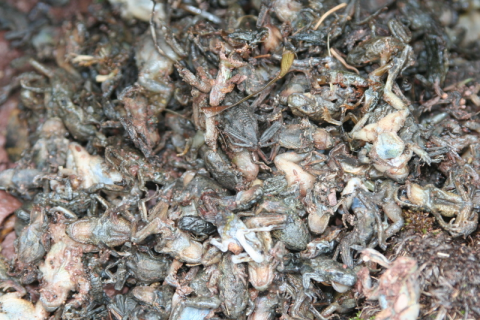You are here
Development of a rapid diagnostic test for chytrid fungus affecting amphibians world-wide

A team of Exeter scientists working closely with Paignton Zoo, hope to prevent the spread of the amphibian fungal disease Chytridiomycosis by developing a quick and easy tool to detect the presence of the fungal pathogen Batrachochytrium dendrobatidis (Bd) in the field.
The chytrid fungus - which is thought to have been a major factor in the decline of almost half of threatened amphibians, in addition to the global extinction of over 30 species - has thrived as result of the global amphibian trade. Although the fungus can already be detected, current methods involve cumbersome equipment within specialist laboratories, which can allow the source fungus time to spread before being positively identified.
The team, led by Dr Chris Thornton and Dr Jamie Stevens, will use funding from the Leverhulme Trust to develop a cheap “point-of-care test” to detect the presence of Bd during any stage of its life cycle using Bd-specific monoclonal antibodies. Dr Thornton has previously used the same technique to successfully develop and export point-of-care tests for other fungal diseases, although this will be the first use of the technique on an amphibian pathogen. The successful development of this tool to detect Bd will reduce the diagnosis time of Chytridiomycosis from days to minutes, which could transform amphibian quarantine and translocation practices, and vastly reduce the fungus’ spread.
Photo courtesy of Mat Fisher, Imperial College London.
- 7733 reads
The University of Exeter, The Queen's Drive, Exeter, Devon, UK EX4 4QJ
Copyright and Disclaimer


